A scattering of ashes.
Ilkley Moor is a small, windy, heather-covered hill in Yorkshire in northern England. It’s due north of the old textile city of Bradford, in the heartland of the coal-fired industrial revolution. At just over 400m high, the moor is home to grouse, sheep, bilberries and hordes of local tourists who jam the small car parks up by the Cow and Calf pub near the top. It’s been occupied for thousands of years -the hill, not the pub- and is dotted with Stone and Iron Age sites including an ancient Neolithic swastika carved into a rock on top of the moor. And don’t forget the Twelve Apostles – a dozen prehistoric standing stones arranged in a henge-like circle on the top.
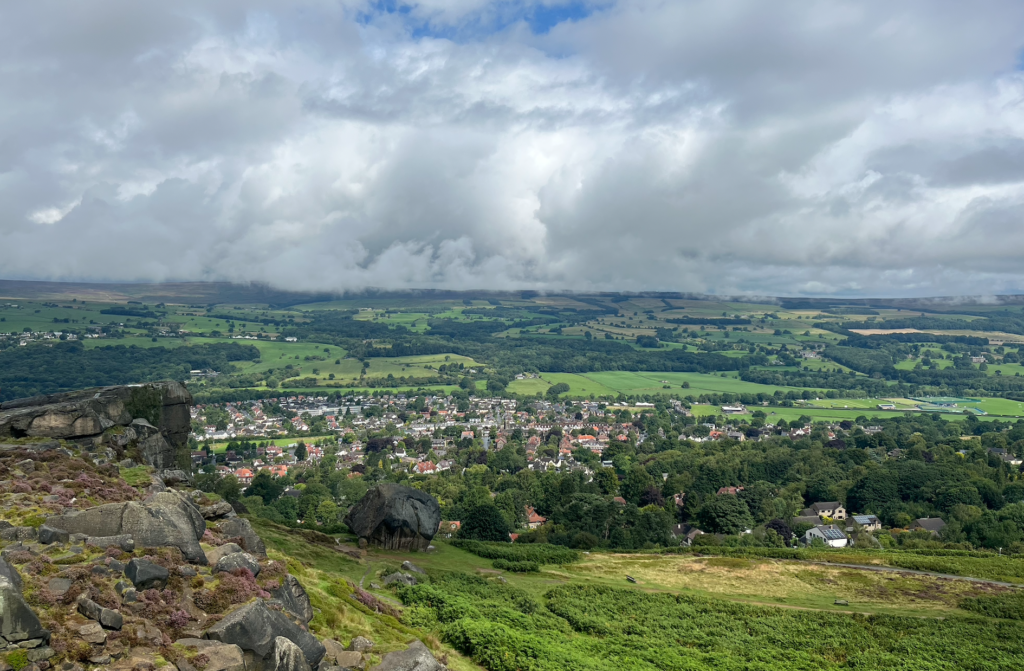
Can tha’ sing ‘owt?
But in Yorkshire folk lore, this inconsequential hummock carries true weight. Mention its name to a born and bred Yorkshireman and I guarantee he’ll start singing. Eyes filling with warm, nostalgic tears, the holy words “On Ilkley moor baht’at” will spring forth from his lips set to a simple, familiar tune that all Yorkshire folk learn in their mother’s womb. He’ll then explain to you with slow gravitas that the phrase means “On Ilkely Moor without a hat”. Awe inspiring stuff. While most patriotic English people can sing along to (bear with me here) Sir Edward Elgar’s orchestration of Sir Hubert Parry’s gorgeous musical setting of the mildly insane William Blake’s classic poem, Jerusalem -which ponders whether Jesus briefly created heaven in the heart of industrial England- Yorkshire folk prefer to sing about small hills and hats.
Wear A Bloody Hat!

The song is actually a gloomy warning about death, decay and the importance of wearing the right clothes in cold weather. Our nameless protagonist has been courting a girl, Mary Jane, on Ilkely Moor in the dead of winter BUT HE WASN’T WEARING A HAT! This pretty much guarantees he’ll die from the cold, leaving Mary Jane to find herself a new beau with better headgear. Obviously Mr Hatless will have to be buried, whereupon he’ll be eaten up by worms. Then, the local ducks will come along and eat the worms, and shortly after that, the hungry folk from Ilkley will eat the ducks for lunch and by extension eat our amorous-but-dead hero. It’s become the semi-official Yorkshire anthem and if you fancy a listen, click here – a wonderful version sung in an old-time Yorkshire accent.
My Dad.
My dad was steeped in this folklore from the moment he could crawl, so naturally when he passed away at the ripe old age of 91, the last wishes of Charles Herbert Rushton were to be cremated and for his ashes to be scattered on the slopes of Ilkley Moor. By coincidence his sister, my Aunt Mary, passed away in Australia at about the same time as dad died and also asked to be taken there. And my step-family mingled my dad’s ashes with my stepmother Freda’s so they could be together on the moor. Dad didn’t specifically mention the song in his things-to-do-when-I’m-gone list but I did find myself humming it sotto voce during the proceedings, whilst keeping a wary eye open for plump-looking ducks.
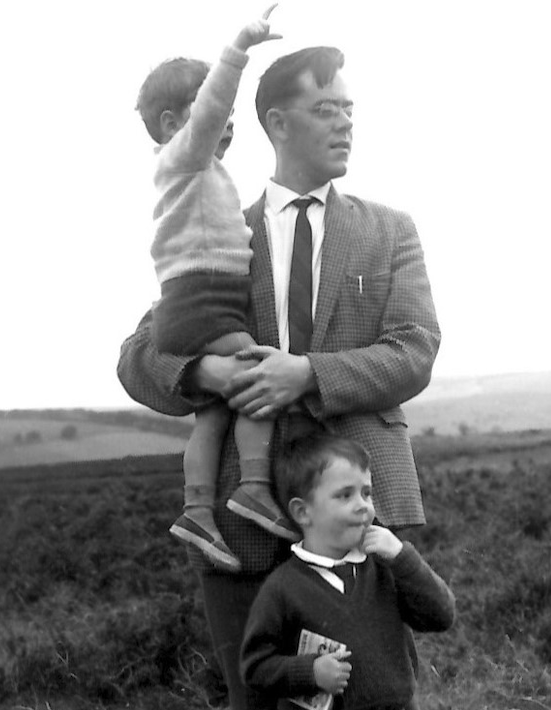
The Cow and Calf
The extended family -including my cousin Steve from Australia bearing my aunt (in the middle of the photo below) – gathered on the hill with our dearly departed at 10.30am on Friday, August 4th. Three large urns hold a lot of ashes for one ceremony so I was praying for a windless morning to avoid a Big Lebowski repeat. But I needn’t have worried. It was a lovely day for a scattering and the 3 of them were sprinkled around the famous Cow and Calf rocks on the north slope of the moor; a spot with glorious views over Ilkely, Wharfedale and beyond. We poured most of a bottle of Black Sheep Ale over the sandy grey remains of dad and Freda; a last tipple to send them on their way. A sudden rain shower at the end ensured our loved ones were immediately taken into the soil and will always be a part of that iconic northern English landscape. Perfect.
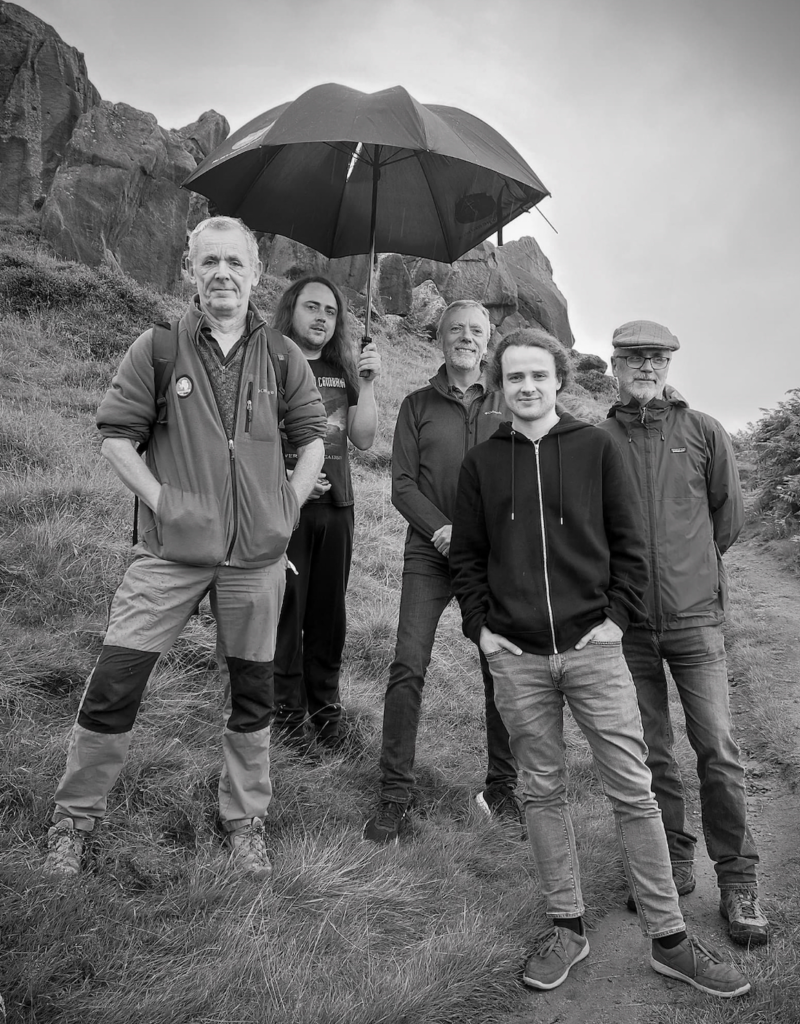
The spot we chose on the moor is just down slope from a cluster of old quarries. The largest is amphitheatre-shaped – a horseshoe of low cliffs that are perfect for rock climbing and were covered in kids dangling off ropes when we were there. The grey-brown rock -known as Millstone Grit, which is about 325-million years old, roughly the same age as David Attenborough- was mined as building stone for Ilkley, a Victorian spa town and a popular tourist spot for the hard-working folk from nearby Leeds and Bradford. It’s a coarse, gritty sandstone full of small pebbles, and there are no prizes for guessing where it got its name. It was perfect for making the big round millstones they use in water mills to grind wheat. Wherever you go in northern England, if you see an old millstone lying around, chances are it’s made of the same rock.
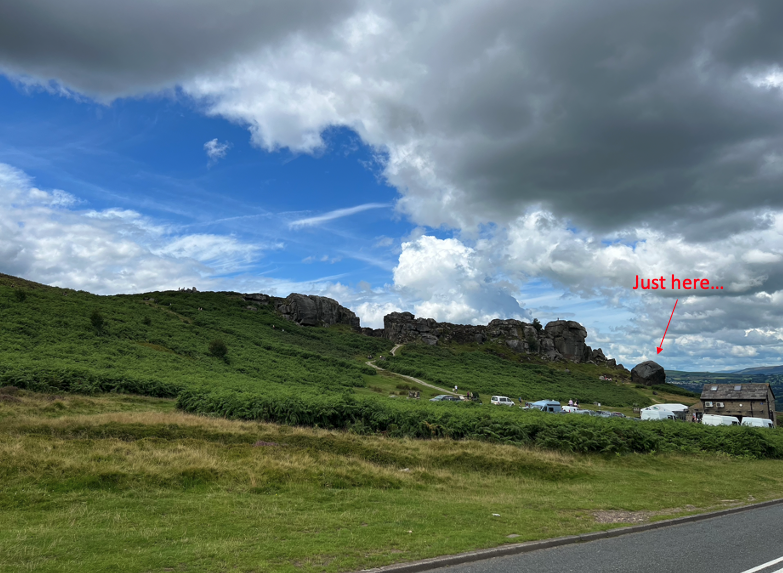
The road up to the quarry, which is now the main tourist path, is covered with chunks of slaggy looking rubble, all bubbled and glassy, probably clinker taken from the fire boxes of the steam trains that served the valley up to the 1960s. They burned tons and tons of coal, producing lots of hard clinker which had to be dumped somewhere and made perfect road fill.
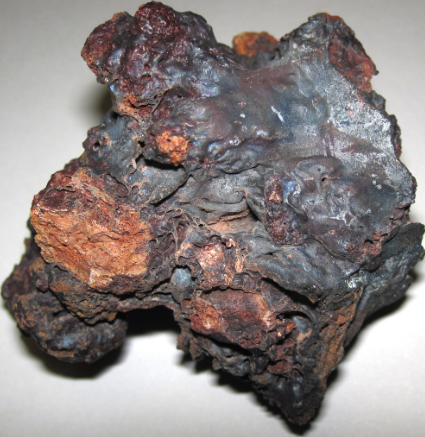
They’ve Landed.
Across the valley from Ilkley moor, dotted along the horizon like a row of white golf balls, are the sinister-looking “radomes” of RAF Menwith Hill; a UK government owned / US operated satellite monitoring station and “intelligence gathering location”.
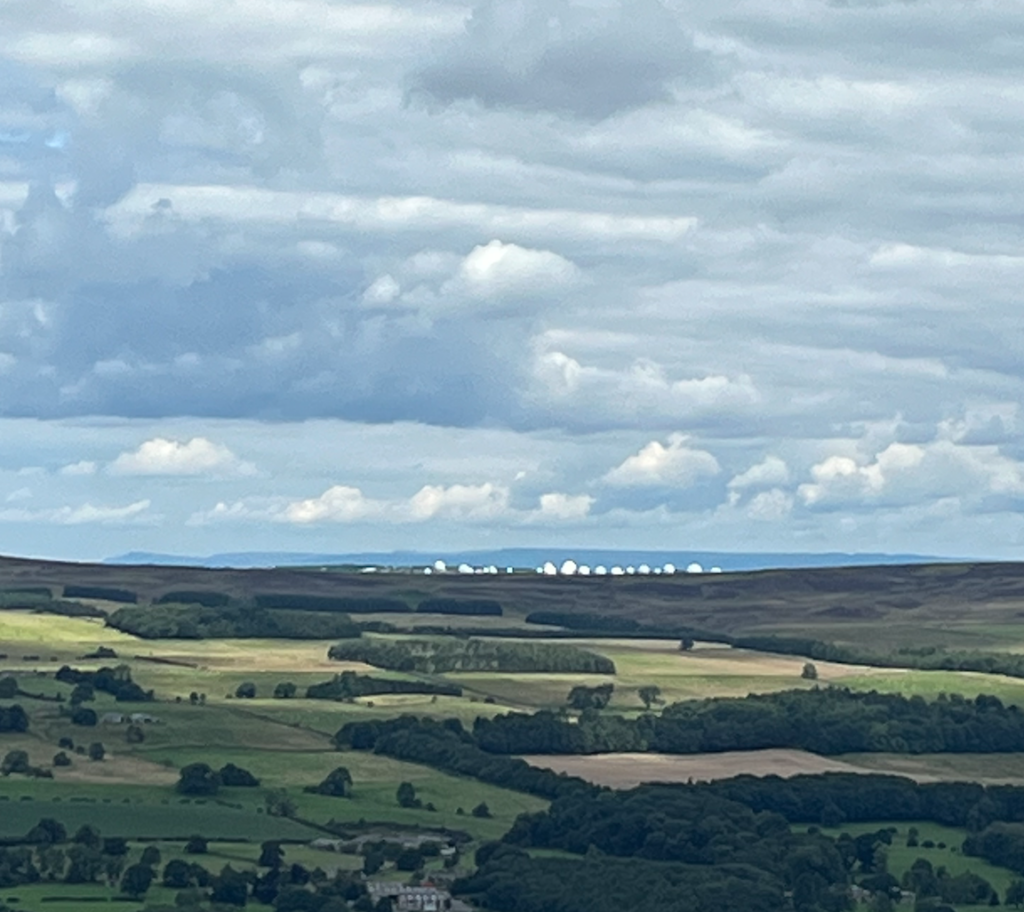
Some 400 American operatives are based there, listening in to the global airwaves, scanning the internet for words like Al Qaeda, drugs, arms smuggling, coup, people trafficking – that kind of thing. They can’t be that observant though, because in 1987 they (apparently) missed a UFO landing right under their noses on the moor when a retired policeman named Philip Spencer claimed to have been abducted and “experiment on” by a lanky humanoid.
My mum, God rest her soul, once stopped her camper van just outside the main security gate of Menwith Hill. She was on her way to my brother’s house in nearby Summerbridge and got out to snap a few photos of the spooky-looking facility, as any of us would, right? She left when “the nice men with guns turned up in a big black Land Rover and wanted to know what she was doing and why she needed pictures.” Bless.
Fish and Chips
When the ash sprinkling was all done, we decamped to nearby Menston, home to one of my dad’s favourite eateries, the legendary fish and chip restaurant formerly known as Harry Ramsdens but now part of the much duller sounding Wetherby Whaler chain. Sat at a modest table for 16 with the extended family, I ordered haddock and chips with mushy peas and a giant pickled onion and proceeded to overeat, teeing up a rather bloated and uncomfortable afternoon as we drove back to my stepsister’s place in York. Dad would’ve been happy.
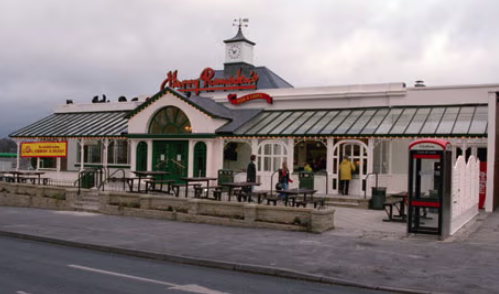


Lovely. Thanks Ralph.
big hugs on what was a sombre occasion. that said, i’m glad you had family around you to back you up. Now this is a song that my dad used to sing or whistle under his breath when my brother and i were younger…
Dance to your Daddy, my little laddie
Dance to your Daddy my little man
Dance to your Daddy sing to your mommy
Dance to your Daddy my little man
You shall have a fishy on a little dishy
You shall have a fishy when the boat comes in
You shall have a herring on a little dishy
You shall have a herring when the boat comes in
Come here me little Jacky
Now aw’ve smoked mi backy
Have a bit o’ cracky
Till the boat comes in
I know that song. It was the theme to a popular tv show. A traditional folk tune.
Sung by fishwives at North Shields fish market